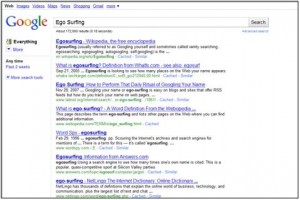By Julia Kim
Egosurfing. Vanity searching. Self-Googling. They all mean the same thing–but what exactly is it? It’s simply the act of using a search engine to gather information about yourself. Googling your surname. Last name. Full name. Screen name. Anything that hints at your identity. I am sure you have done it before and although you may not admit to it, you can’t deny that it provides pleasure.
I assume this is partially a result of the increase in narcissism in our society today, but I think it’s safe to assume that some of it is the result of the necessity of keeping track of and promoting a positive, beneficial personal identity online. It is also a fact that some may Google oneself to find what others see when they Google them.
Teenagers–well, to those who it applies to, including me–we are worried to a certain extent, some more than others, about our reputations online because of college. The fact that anything, and everything, online is available for viewing by future schools is a scary thought. The constant reminders by the so-called “technology sub” do not help either. And that scary thought has internally raised a lot of defenses within us.
You might also find yourself Googling others–family, friends, peers, anyone. It might reveal rare embarrassing scraps of information or provide information to reconnect with old friends and teachers. It might expose unknown facts or shock you. Egosurfing has quite the potential to disclose much–maybe unwanted–info.
Today, it is blatantly evident there is a rise in the availability, and the extent of that availability, of work information, birthdates, photos and interests through social networking sites. Although you can manage and manipulate privacy settings on these sites to your advantage, it’s a given that others can still manage to find it.
And now, in addition, it’s not just adolescents that find themselves indulging in such tasks; this has also plagued a significant portion of the adult population. According to a study done by the Pew Research Center’s Internet & American Life Project, 57% of American adults participate in ego-surfing. Adults, on the other hand, are becoming less worried about the amount and seriousness of personal information found online.
Although I am not necessarily surprised by the increase in adult involvement, I am a bit ashamed of this growth in usage. The fact that it has raised a substantial amount is not an encouraging factor, whether it is to track their children or to keep in touch with friends.
I am relatively positive that the future will not bring solutions; it will actually probably bring an increase–an increase that has the ability to impact even the population of children, quite possibly toddlers at some point. I can only sit back and watch as this phenomenon unravels.









